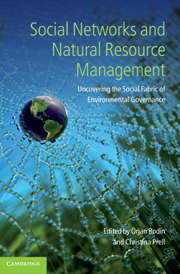 Social Networks and Natural Resource Management
Social Networks and Natural Resource Management from Part II - Case studies
Published online by Cambridge University Press: 05 June 2012
Introduction
In the past several decades there has been a growing interest in the human/social dimensions of forestry and other natural resource industries. In the past several years a specific interest in the role of social networks in these domains has arisen (Hubacek et al., 2006, Prell et al., 2009). There are many possible ways in which social networks might be important to societies/communities and natural resources. Communities themselves can be thought of as social networks (Wellman, 1979). Networks play an important role in diffusing information (Coleman et al., 1966). Beliefs, values, and attitudes are formed partly in the context of network structures (Erickson, 1988; Harshaw and Tindall, 2005). Individuals are connected to one another through organizations (Breiger, 1974) in what are sometimes called two-mode networks. Political economists sometimes look at interorganizational ties, and the ways in which business leaders are linked through interlocking directorships (Carroll, 2004). Collective actions and social movements usually have a network basis (Diani and McAdam, 2003). Network analysts have examined the role of social networks in environmental movements that have arisen vis-à-vis various environmental and natural resource issues (Diani, 1995; Tindall, 2002, 2004).
To save this book to your Kindle, first ensure [email protected] is added to your Approved Personal Document E-mail List under your Personal Document Settings on the Manage Your Content and Devices page of your Amazon account. Then enter the ‘name’ part of your Kindle email address below. Find out more about saving to your Kindle.
Note you can select to save to either the @free.kindle.com or @kindle.com variations. ‘@free.kindle.com’ emails are free but can only be saved to your device when it is connected to wi-fi. ‘@kindle.com’ emails can be delivered even when you are not connected to wi-fi, but note that service fees apply.
Find out more about the Kindle Personal Document Service.
To save content items to your account, please confirm that you agree to abide by our usage policies. If this is the first time you use this feature, you will be asked to authorise Cambridge Core to connect with your account. Find out more about saving content to Dropbox.
To save content items to your account, please confirm that you agree to abide by our usage policies. If this is the first time you use this feature, you will be asked to authorise Cambridge Core to connect with your account. Find out more about saving content to Google Drive.